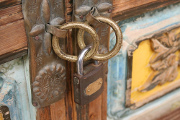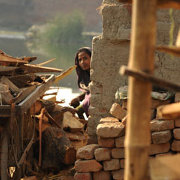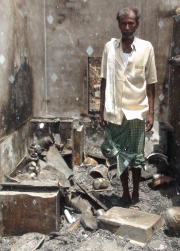 |
| (Photo courtesy of Andy Fitz)
|
Indonesia (MNN) ― The rise of covert persecution tactics on Christians in Indonesia may be moving this country up the rankings on the
World Watch List of worst places for Christians to live.
According to Compass Direct News, last year Indonesia had a total of 64 cases of violation on Christian freedoms. This year, Indonesia has reached nearly two-thirds of that number already with 40 Christian freedom violations in these first five months.
22 churches have been forced to close down by the Indonesian government this year. 18 of those occurred just within the last month in the Aceh Province after the election of a hard-line Islamic governor.
Direct violence has also increased. On May 17, 600 Islamists threw bags of urine and ditch water at 100 members of the Philadelphia Batak Christian Protestant Church in Eastern Indonesia. So far this year, the extremist group, Islamic Defenders Front, has carried out two attacks on the Gereja Pentakosta di Indonesia church.
If this trend of persecution continues through the year, marginalization of Indonesian Christians will have increased by 50%. This will be the third year in a row that persecution has gone up.
However, the trials Christians in Indonesia face don’t always make the news.
Greg Musselman with
Voice of the Martyrs, Canada says, “The persecution is not as violent [in Indonesia] as in places like Nigeria, which gets a lot of coverage, but it’s an ongoing situation there. Christians are marginalized, and with the rise of more of a militant Islam, there’s concern that it’s going to become even worse in Indonesia.”
While violent persecution still happens in Indonesia, Musselman says that even the passive-aggressive restrictions on the church need to be taken seriously. “[In] Indonesia, because it’s just more subtle pressure on Christians, it has a very devastating effect on people who are willing to reach out….When it’s more violent, [people] have to make a decision, ‘Are we willing to spread the Gospel in the face of such danger?’”
“It’s an ongoing, always underlying [pressure in] the life of the church there. In some ways they accept that and say, ‘Well, this is just the way it is.’” Musselman begs the question, “When do you speak up and say, ‘Enough is enough and we’re going to meet no matter what and the government can’t do this to us?' Does that fuel more persecution?”
Some would say because select Islamic groups have been disbanded, like the Laskar Jihad back in 2002, that persecution of Christians in Indonesia can’t be that bad.
But Musselman points out, “The way things are going with the rise of some of these Islamic groups, they disappear, then they come back as a new name…. The reality is: there are other [Islamic] groups that are starting to come together in this worldwide networking between the groups like Al Qaeda, Boko Haram, and Nigeria.”
A review on the Laskar Jihad published last year by GlobalSecurity.org says although it’s officially disbanded, the group continues activities of persecution and marginalization of Christians and other ethnic minorities on the Indonesian islands.
Despite all this, the church in Indonesia is steadily growing.
Musselman was encouraged by meetings he had with Indonesian believers in underground Bible colleges and discipleship training centers. “The passion of these young people to go and plant churches, and the amazing stories that we’re hearing [about people] coming to Jesus Christ…they’re phenomenal stories.”
Please be praying for safety and growth of the church in Indonesia. “I can only see that this more sophisticated persecution from the militant Islamist side—which is the issue in Indonesia—is getting stronger,” says Musselman.
“The church needs to be even stronger than the persecution coming at them.”









